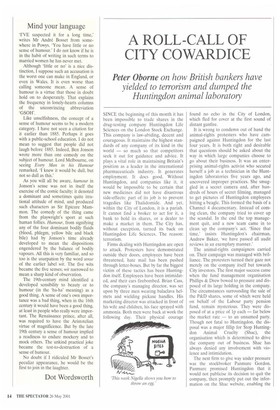Mind your language
'I'VE suspected it for a long time,' writes Mr Andre Bosset from somewhere in Powys. You have little or no sense of humour.' I do not know if he is in the habit of writing in such terms to married women he has never met.
Although 'little or no' is a nice distinction, I suppose such an accusation is the worst one can make in England, or even in Wales. It is even worse than calling someone mean. A sense of humour is a virtue that those in doubt hold on to desperately. That explains the frequency in lonely-hearts columns of the unconvincing abbreviation `GSOH'.
Like unselfishness, the concept of a sense of humour seems to be a modern category. I have not seen a citation for it earlier than 1885. Perhaps it goes with a public-school education. I do not mean to suggest that people did not laugh before 1885. Indeed, Ben Jonson wrote more than one comedy on the subject of humour. Lord Melbourne, on seeing Every Man in his Humour remarked, 'I knew it would be dull, but not so dull as this.'
As you will all be aware, humour in Jonson's sense was not in itself the exercise of the comic faculty; it denoted a dominant and sometimes quite irrational attitude of mind, and produced such characters as Sir Epicure Mammon. The comedy of the thing came from the playwright's sport at such human follies. Humour, from signifying any of the four dominant bodily fluids (blood, phlegm, yellow bile and black bile) had by Jonson's time already developed to mean the dispositions engendered by the balance of bodily vapours. All this is very familiar, and so too is the usurpation by the word sense of the earlier label wit. The five wits became the five senses; wit narrowed to mean a sharp kind of observation.
The 19th-century mind identified a developed sensibility to beauty or to humour (in the 'ha-ha' meaning) as a good thing. A sense of one's own importance was a bad thing, when in the 16th century it would have been a good thing, at least in people who really were important. The Renaissance prince, after all, was required to have the Aristotelian virtue of magnificence. But by the late 19th century a sense of humour implied a readiness to endure mockery and to mock others. The unkind practical joke became the test-to-destruction of a sense of humour.
No doubt if I ridiculed Mr Bosset's peculiar appearance, he would be the first to join in the laughter.
Dot Wordsworth


















































































 Previous page
Previous page